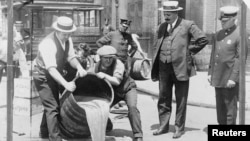Eighty years ago, an unusual experiment in the United States came to an end. On December 5, 1933, the 21st Amendment to the Constitution was ratified. It repealed a previous amendment that had banned the production and sale of alcohol. It was the end of a political struggle that had raged in the United States for more than 100 years - a struggle that had been argued, in part, through music.
There were many issues that engaged Americans in the years between the War for Independence and the Civil War -- separation of church and state, U.S. relations with France and England, but while those others came and went, the battle over one subject never let up. That subject was alcohol.
The war against drinking in the U.S. started in the early 1800s. Before then, Americans had been heavy drinkers. Scott Gac, a professor at Trinity College in Hartford Connecticut, and the author of a book about reform in the 19th century, says that in the 1820s and 1830s, American churches started emphasizing the idea that God wanted people to take better care of themselves.
“They start eating differently. There are people who actually became some of the first vegetarians in the United States," he explained. "There are people who stop drinking alcohol -- about one in five Americans take a temperance pledge, which is an anti-drinking pledge."
Temperance advocates preached about the evils of alcohol.
“The breadwinner in the family was going out, spending what little money he had, and thus creating poverty for his family," Gac said. "His wife had to work, his kids had to go out and beg on the street, so drunkenness was eating at the core of American families.”
Because the temperance movement came out of the church, a lot of the songs were to the tune of popular hymns. People would sing these songs at meetings of groups like the Women’s Christian Temperance Union, who would go out and smash up saloons with hatchets. By 1900, more than half of the states had gone “dry,” restricting or even banning the sale of alcohol. Of course there were plenty of people who opposed this idea, and they also expressed themselves in song.
In the wake of the First World War, Temperance advocates were finally able to get enough votes to put a ban on alcohol into the United States Constitution. The 18th Amendment to the Constitution prohibited “the manufacture, sale, or transportation of intoxicating liquors.” But the Constitution still protected people’s right to argue that Prohibition was a bad idea. And they did. One example is a song from the year Prohibition started about how one used to need a lot of money to get a date, but now all one needed was a secret stash of alcohol in the basement.
The ban on alcohol only lasted 13 years. By 1933, the forces of prohibition admitted defeat, the 18th Amendment was repealed, and alcohol flowed freely again in the United States. And that was cause for song too.
There were many issues that engaged Americans in the years between the War for Independence and the Civil War -- separation of church and state, U.S. relations with France and England, but while those others came and went, the battle over one subject never let up. That subject was alcohol.
The war against drinking in the U.S. started in the early 1800s. Before then, Americans had been heavy drinkers. Scott Gac, a professor at Trinity College in Hartford Connecticut, and the author of a book about reform in the 19th century, says that in the 1820s and 1830s, American churches started emphasizing the idea that God wanted people to take better care of themselves.
“They start eating differently. There are people who actually became some of the first vegetarians in the United States," he explained. "There are people who stop drinking alcohol -- about one in five Americans take a temperance pledge, which is an anti-drinking pledge."
Temperance advocates preached about the evils of alcohol.
“The breadwinner in the family was going out, spending what little money he had, and thus creating poverty for his family," Gac said. "His wife had to work, his kids had to go out and beg on the street, so drunkenness was eating at the core of American families.”
Because the temperance movement came out of the church, a lot of the songs were to the tune of popular hymns. People would sing these songs at meetings of groups like the Women’s Christian Temperance Union, who would go out and smash up saloons with hatchets. By 1900, more than half of the states had gone “dry,” restricting or even banning the sale of alcohol. Of course there were plenty of people who opposed this idea, and they also expressed themselves in song.
In the wake of the First World War, Temperance advocates were finally able to get enough votes to put a ban on alcohol into the United States Constitution. The 18th Amendment to the Constitution prohibited “the manufacture, sale, or transportation of intoxicating liquors.” But the Constitution still protected people’s right to argue that Prohibition was a bad idea. And they did. One example is a song from the year Prohibition started about how one used to need a lot of money to get a date, but now all one needed was a secret stash of alcohol in the basement.
The ban on alcohol only lasted 13 years. By 1933, the forces of prohibition admitted defeat, the 18th Amendment was repealed, and alcohol flowed freely again in the United States. And that was cause for song too.





